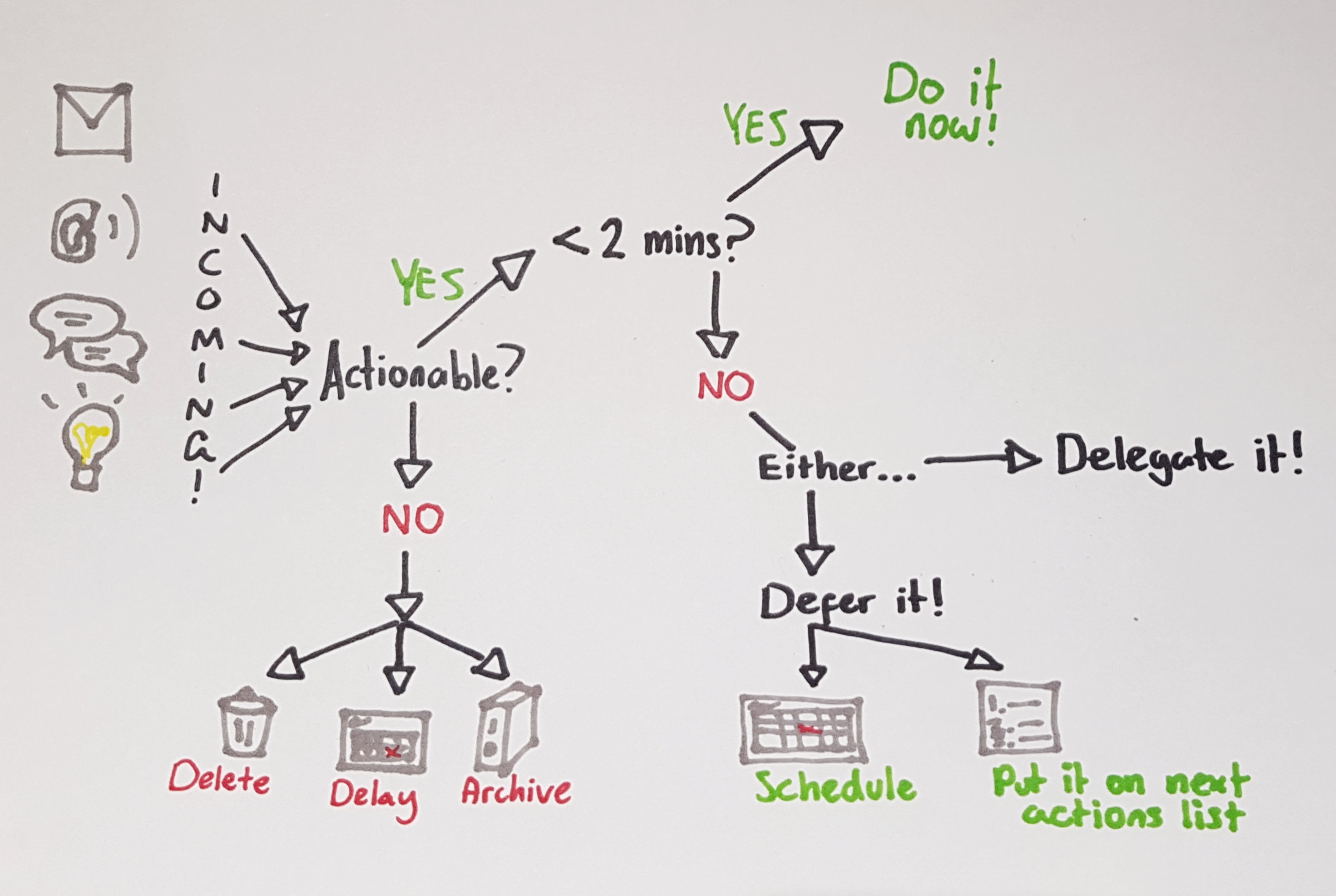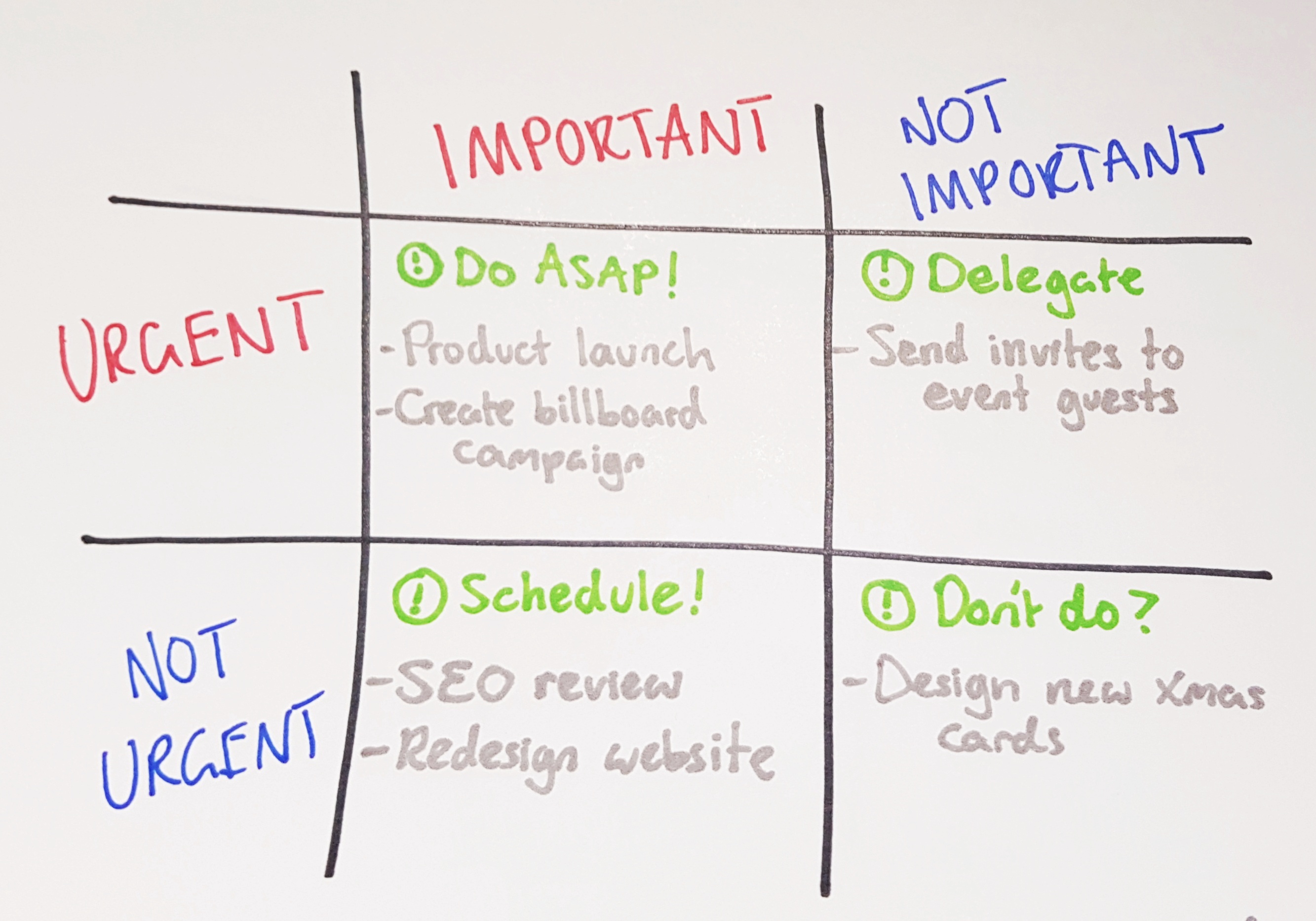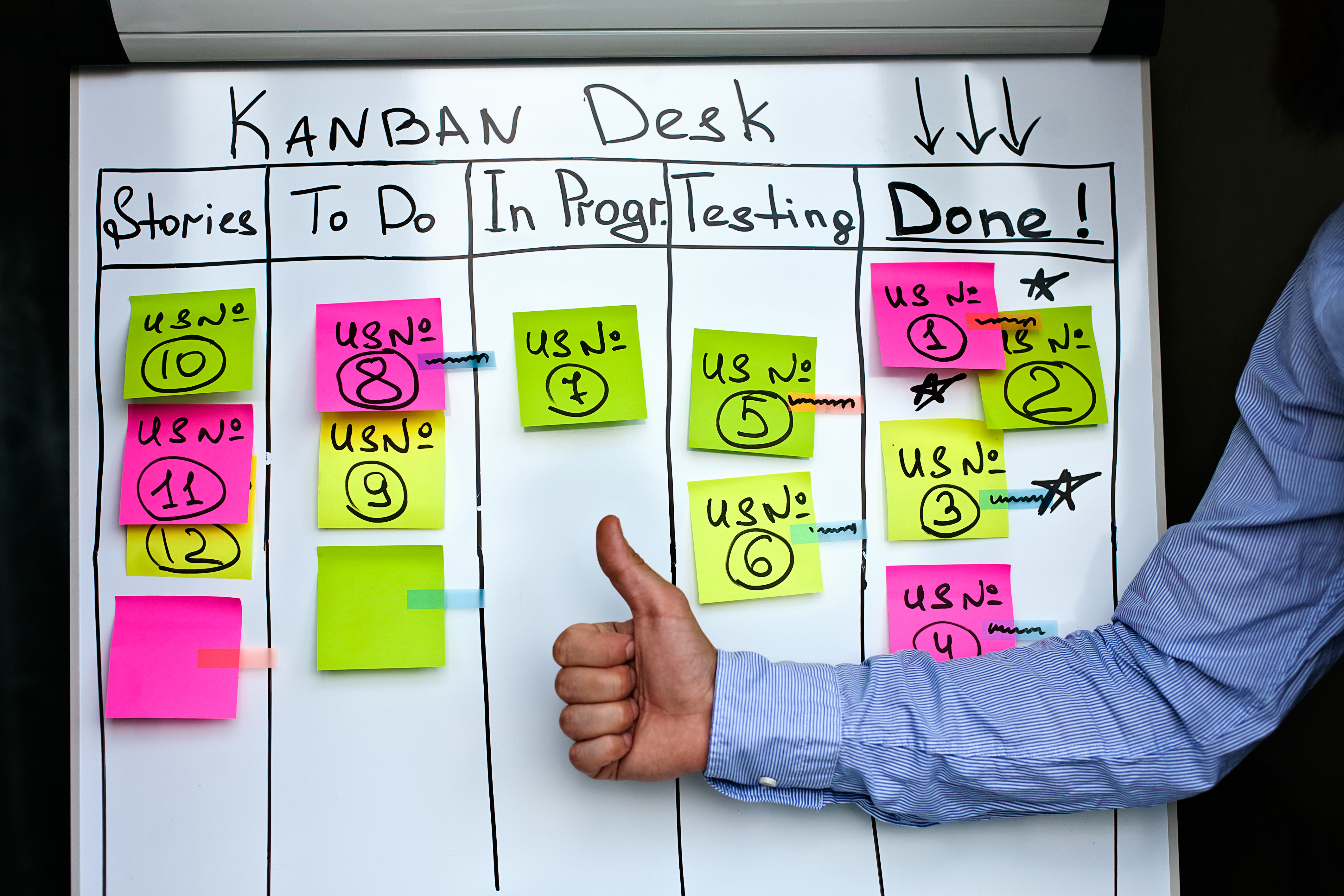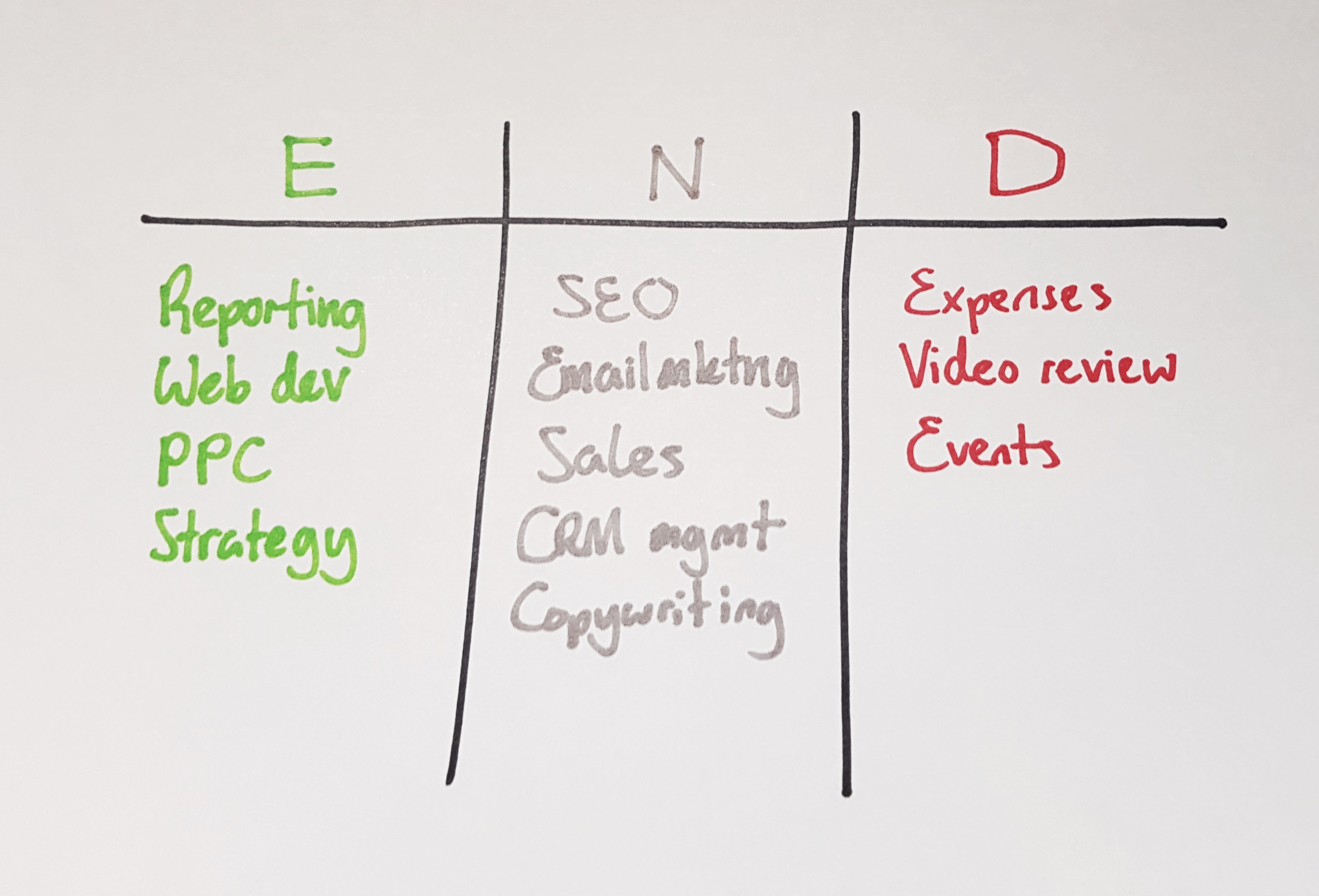There are an almost indefinite number of ideas out there when it comes to how best to schedule your time.
For me, prioritising tasks and scheduling is particularly challenging, because of the sheer variation of tasks which need doing in any given day. That's fun, but it can be difficult when it comes to deciding what to do.
Over the last few years, I've tried out various methods for managing my time. What I found is that some ideas work for me, others don't, but that no single idea worked alone. Only by emalgamating ideas was I able to find a natural rhythm. That might well be different for you.
But getting scheduling and task priority right can help you become far more productive, energised and successful. In this post, I'll share 6 ideas that I like, explain how they work and whom they might be useful for. I hope you find something in here that will be useful for you!
5 Ideas
1. Shorten the Backlog, Maintain Priority: The GTD Method
David Allen's advocates a very specific method for scheduling in his best-selling book Getting Things Done.
For any given task, ask yourself: is it actionable? If not, either discard or archive it. If so, then if the task can be completed in less than 2 minutes, do it straight away. Otherwise, schedule it for the future.
Then, group remaining tasks by deadline, project (for example, launching a new product) or context (people to call) and use your common sense to fill in the gaps in your diary.
That's great - context switching is mentally draining and psychologically difficult to do, so grouping similar tasks is good for productivity.
Allen says we should always be asking "what is the next possible action?" - of course, that's not always the best way of working if your work involves "deep work". Creativity could be stymied by this approach, and I think that if you were to literally write down every single next action, that would lead to overcomplicated the system and oversimplifying work. Let's face it, it isn't always possible to distil interesting tasks down to a next possible action, and it shouldn't be.

Good if: Working methodically through tasks suits you, you have good self-discipline.
Bad if: You're looking for something that helps you prioritise your tasks in detail, or how you're feeling creatively or how much energy you have affects the way you work
2. Eisenhower: Is It Urgent? Is It Important?
Eisenhower's Urgent/Important principle encourages us to distinguish between useful activities and mere distractions.
My favourite way of doing this is to divide a piece of paper into four quarters, marking the two columns "Important" and "Not Important", and the two rows "Urgent" and "Not Urgent".
Important activities lead to the achievement of defined goals, whilst urgent activities require immediate attention due to some deadline (often to help someone else complete a task which they regard as important... but that is not necessarily important to you..!).
Sort your tasks into a grid, like this:

-
Important and Urgent - do these first! tasks are often ones which have been left until the last minute. Having lots of tasks here might indicate space for optimisation of your processes. Of course, emergencies arise - it's always best to leave some time available in your schedule for things like this.
-
Important but Not Urgent - schedule it! tasks are how you're going to achieve your goals. It's imperative you make time for them, even though they may not be time-sensitive!
-
Not Important but Urgent - delegate! These tasks are getting in the way of you achieving your goals. Can you delegate them, or manage expectations to extend the deadline?
-
Not Important and Not Urgent - don't do it! Forget it! If you can cancel, ignore or delegate a task like this, go for it.
This principle is all about finding smarter ways to spend your time - not just spending it efficiently.
In practice, you might not feel you need to write it all out every time. I think it can be helpful just to think through which categories my tasks would fall into, to help me target the tasks for completion which will get me closer to reaching our goals.
Good if: You want to optimise the amount of time you spend on useful tasks, or you find yourself wasting lots of time on unecessary tasks.
Bad if: You're looking for a more strongly defined framework for organising individual tasks into a schedule
3. Kanban
Kanban is all about getting to 'done' in a customer-centric way. It's a bit more than a scheduling technique - it's usually associated with software development, as a vehicle for implementing agile methodologies.
I use a digital Kanban board for Northcoders' internal software engineering tasks, but also to help the Northcoders Growth Team organise our workflow, as well as the videography and design "sub-teams". The principles carry over nicely to other disciplines.
In Kanban, tasks are visualised on a board that looks something like this:

On the left side, I'd usually create a "backlog" column of tasks waiting to be completed.
You'll limit the amount of cards - representing tasks - that can be in any one column at each time, preventing bottlenecks. The idea is that when a task moves to the "done" column, you'll pull the next available card from the top of the backlog and start working on it. The next available card is traditionally the one which will create value for the customer.
This prevents you multitasking, which is proven to be less efficient as you'll find yourself distracted flitting between tasks.
Kanban implemented properly should mean that you're always focussing on getting tasks done and avoiding starting lots of things but not finishing them, or are prone to not finishing tasks you've started.
Good if: You want a scheduling process which doesn't take much time and is very visual, or are prone to unfinished tasks.
Bad if: You want less oversimplified guidance on prioritisation (customer-centric prioritisation doesn't work for every department..!), work on more complex projects, need to schedule indefinite or repeating tasks (such as monitoring social media or checking incoming orders), or you aren't likely to keep it up to date, which is a common pitfall.
4. The END: Remembering We're Human
None of the methods above acknowledge one of the most important aspects of being human: we get tired.
That's what the E.N.D. approach to scheduling is for.
Create a spreadsheet with three columns: Energising, Neutral and Draining. Then run through your tasks, in as granular way as is possible, placing them in one of the three columns. Take stock.

Do you notice any patterns? Are there any tasks which drain you which aren't generating value or helping you achieve your goals? Could they be delegated or outsourced?
If an activity is draining, but there's no way of not doing it, just get it over and done with. Face it with as much positivity as possible (After a few months of complaining bitterly about having to do expenses, I realised that the complaining itself made the experience even worse - I feel a bit better about it now I've stopped creating a self-fulfilling prophecy of how much I despise it..!) Motivate yourself by scheduling an energising task next, and don't leave draining tasks to fester - get them done in the morning.
Everyone has times of the day at which they are "at their best" - do your favourite tasks at this time so that you can really shine. You'll be able to do more of the things you enjoy this way, because you're doing it when you're most productive.
Good if: You're prone to burning out, your energy levels fluctuate or want to make the most out of yourself when you're at your best.
Bad if: Helping yourself stay energised isn't a priority for you.
5. Live Your Priorities
What really matters?
My job is one of the most important aspects of my life, but for me, it's my family that matter most. I wouldn't work for a company that wouldn't make space for me to put them first, so long as I pull my weight.
Anybody should respect themselves enough prioritise what matters for them where it is possible and reasonable to do so - and for many (if not most) people, their priority won't be their job - and that is ok!
Sometimes it is easier said than done and there has to be compromise. However, it's still possible to set clear boundaries for yourself. For example, you might say you'll keep your working life at work, and turn off your work-related notifications at home. You might set a rule that you won't work late more than twice a week. You might save annual leave so that you can make your child's school sports day.

In The Now Habit, Neil Fiore advocates going even further - schedule all of the most pleasant parts of your week first. Fit everything else in around it. That way you'll make time for that lunch date; that morning run; that trip to the theatre.
Although I can't say I always manage this, this is surely something to strive for. No point forgetting to live..!
Good if: You don't want your work to dictate your life.
Bad if: ...Well, what could be bad about putting Number One first?
It's Whatever Works For You
Scheduling algorithmically can help us get the right tasks done more quickly, and when done right, they should help us enjoy our work more and get more out of it.
That said, there are always going to be times and situations for which the rules are there to be broken. That is life. I don't find it helpful to get too religious about a scheduling habit, because occasionally they will hinder you. But so long as this is exceptional and not the rule, that's fine.
Personally, I take a combination of these approaches above and use a bit of common sense to decide what's best for any given set of tasks. For example, at the highest level, I schedule my family life first and then assess what time remains. I use an Urgency/Importance grid at the highest level of my working life, and use a Kanban board for my development work and for tracking my team's design and videography tasks. When I'm not feeling at my best and am getting tired (or feel I might become tired), I bring in ideas from E.N.D.
What are your favourite ways of deciding how to organise your time? Let me know on Twitter @RuthYMNg !!



